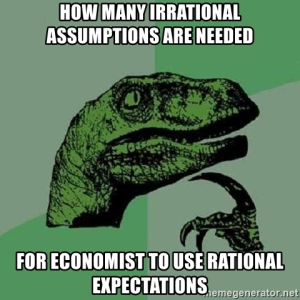The rational expectations hoax A lot of mainstream economists still stick with ‘rational expectations’ since they think it has not yet been disconfirmed. They are, of course, entitled to have whatever views they like — after all, it is, to say the least, difficult to empirically disconfirm the non-existence of Gods … But for the rest of us, let’s see how rational expectations really fare as an empirical assumption. Empirical efforts at testing the correctnesss of the hypothesis have resulted in a series of empirical studies that have more or less concluded that it is not consistent with the facts. In one of the more well-known and highly respected evaluation reviews made, Michael Lovell (1986) concluded: it seems to me that the weight of empirical
Topics:
Lars Pålsson Syll considers the following as important: Economics
This could be interesting, too:
Lars Pålsson Syll writes Schuldenbremse bye bye
Lars Pålsson Syll writes What’s wrong with economics — a primer
Lars Pålsson Syll writes Krigskeynesianismens återkomst
Lars Pålsson Syll writes Finding Eigenvalues and Eigenvectors (student stuff)
The rational expectations hoax
 A lot of mainstream economists still stick with ‘rational expectations’ since they think it has not yet been disconfirmed. They are, of course, entitled to have whatever views they like — after all, it is, to say the least, difficult to empirically disconfirm the non-existence of Gods …
A lot of mainstream economists still stick with ‘rational expectations’ since they think it has not yet been disconfirmed. They are, of course, entitled to have whatever views they like — after all, it is, to say the least, difficult to empirically disconfirm the non-existence of Gods …
But for the rest of us, let’s see how rational expectations really fare as an empirical assumption. Empirical efforts at testing the correctnesss of the hypothesis have resulted in a series of empirical studies that have more or less concluded that it is not consistent with the facts. In one of the more well-known and highly respected evaluation reviews made, Michael Lovell (1986) concluded:
it seems to me that the weight of empirical evidence is sufficiently strong to compel us to suspend belief in the hypothesis of rational expectations, pending the accumulation of additional empirical evidence.
And this is how Nikolay Gertchev summarizes studies on the empirical correctness of the hypothesis:
More recently, it even has been argued that the very conclusions of dynamic models assuming rational expectations are contrary to reality: “the dynamic implications of many of the specifications that assume rational expectations and optimizing behavior are often seriously at odds with the data” (Estrella and Fuhrer 2002, p. 1013). It is hence clear that if taken as an empirical behavioral assumption, the RE hypothesis is plainly false; if considered only as a theoretical tool, it is unfounded and self-contradictory.
For more on the issue, permit me to self-indulgently recommend reading my article Rational expectations — a fallacious foundation for macroeconomics in a non-ergodic world in Real-World Economics Review no. 62.
